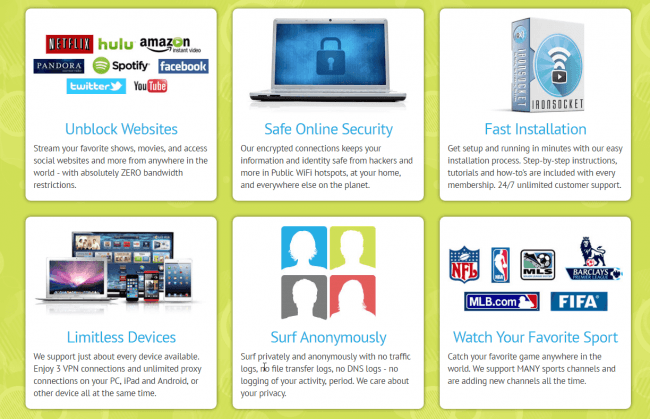IronSocket VPN service is perhaps the oldest VPN service in the industry. IronSocket VPN started way back in the middle of 2004 when the company also launched one of its other products which was named HideMyNet.
HideMyNet was basically a proxy service which allowed users to go through an alternative route rather than go through online censors that blocked content based on the location of the users.
However, all that changed in 2012 when the people behind HideMyNet decided that they needed to go big league in order to reach more people and hence make more money.
The company overhauled most of its products and added extra features which made most of their lineup quite robust.
Fast forward to today and IronSocket has a VPN service that, it claims, is a pretty decent competitor as far as the market is concerned.
Whether that is true or not remains to be seen (since you haven’t read the review yet) but whatever success the team behind IronSocket have had regarding its VPN service, it is certain that it happened because of the enhancements the developers made to the company’s primary product, a VPN service.
But maybe you’re different. Maybe you didn’t even hear about IronSocket VPN before this review, well then don’t despair since you’re not alone and for good reason.
IronSocket VPN, even though an old player, isn’t as sturdy as some of its competitors in the market. The VPN industry is tough and being just good doesn’t cut it anymore.
If you want to increase the number of users of your product then you have to come up with something more than just good. You have to develop a product that is remarkable. That gets people talking and recommending it to their friends and others they know who want to protect their privacy and guard their other sensitive information.
The most prominent flaw in IronSocket VPN from the outset is that it doesn’t have its own VPN client.
Now, why is that notable?
Well, for one reason it is noticeable because all the rest of the top VPN services out there do offer their own native VPN client and hence can ensure the quality and customizability of their product to a great extent.
But IronSocket VPN doesn’t have that. Instead, the company cleverly relies on the open source VPN software application that goes by the name of OpenVPN Connect.
That doesn’t necessarily make IronSocket VPN a bad VPN choice from the get go but we’ll see how well it does in other areas shortly.
The obvious result of not using one’s own VPN app is that it becomes much difficult for new users to setup the VPN service. And since many of the other premium VPN services are offering their own apps, this results in the company losing customers to the company that makes it easier for users to use the VPN service rather than harder.
Note: According to our tests, this VPN provider is not at the same standard as the industry leader IPVanish.
Table of Contents
IronSocket VPN Price
The company offers a single tier VPN service to new users. That’s not something new or even inventive since most of the other premium VPN services out there in the market do the same.
IronSocket VPN changes the pricing options up a bit by offering discounts to users who commit for lengthier periods such as six months and twelve-month subscriptions.
Right now, you can sign up for IronSocket VPN for about $6.99 per month(which converts to about GBP 4.9 if you happen to live in the UK).
However, as mentioned earlier, if you show a bit more faith in the service and sign up for a package for a period of six months then you’ll only have to pay a total of #35.95 (which converts to about GBP 25.2).
And if you decide to purchase the twelve-month package then you have to pay a total of $49.95 (which converts to about GBP 35) for the whole year.
If you divide the yearly package price by twelve (the number of months) then you’re looking at $4.16 (which converts to 2.90 GBP) per month.
That price is pretty competitive if you look at some of the packages that are being offered by other VPN services in the market.
What’s more, IronSocket VPN also throws in a seven-day money back guarantee to new users in order to entice them further into making a positive decision.
The company also offers several payment options. If you don’t want your name to be recorded in their logs as a purchaser of the service then the company allows you to protect your identity by paying for packages with bitcoin.
Of course, Bitcoin isn’t totally anonymous but it’s as close to total anonymity as you are likely to get in the online world.
You can also pay through an unused gift card if that’s your thing. These can be bought from known places such as Walmart or even Starbucks.
IronSocket VPN Features
Subscribers can connect up to three devices at a time when using IronSocket VPN. IronSocket VPN Servers.
As a subscriber of IronSocket VPN, you’ll have access to unlimited bandwidth.
As a bonus feature for new users, along with the traditional VPN service, IronSocket also offers a Smart DNS and an HTTP/SOCKS5 proxy as a part of its subscription packages.
For those who have come into the industry recently, HTTPS and SOCKS5 based proxies are much like VPNs. Only if VPNs were the heavyweight division in boxing and HTTPS and SOCKS5 were in the lightweight one.
The important thing to note about proxies based on HTTPS and SOCKS5 is that they don’t encrypt your traffic.
So, for new users, it is probably better to stick to the main course which is the good old VPN service and leave the rest of the methods of protection yourself in the online world to experienced users only.
So if HTTPS and SOCKS5 proxies are just inferior versions of the standard VPN service, then why have them in the first place?
Well, firstly, “inferior” is a term that is very subjective and secondly, that isn’t the case actually.
The inclusion of a Smart DNS proxy in the main package is a pretty smart move from IronSocket VPN for the simple reason that sites like Netflix and other streaming websites, have started to monitor users who use VPN services to sign up for cheaper packages and hence have started to block the VPN services who provide service to such users.
The phenomena of VPN blocking by streaming websites like Netflix and Hulu is a recent one. In short, VPN users are blocked from accessing TV shows and movies that aren’t available in their home countries because of licensing issues.
Users all over the world tried to circumvent the situation with the use of a VPN service through which they could mimic their computers to show as if they were located in regions such as the United States of America and the United Kingdom which allowed them to evade Netflix’s geographical content restrictions.
VPN users were able to access the best version of Netflix through the use of their VPN services. In case you didn’t know already, the US and the UK version of Netflix are by far the best ones out there because of their superior content in terms of quality and variety.
Netflix engineers though, wanted to stop users from using such tactics so they blocked VPN users from accessing their streaming site.
Nevertheless, you can be pretty confident that IronSocket’s Smart DNS will still allow you to access and then watch great shows on Netflix which won’t be available to you if you live in a place like Bolivia, Iran, China or Russia.
In theory, a Smart DNS is always faster than a VPN service for the simple reason that it doesn’t have to go through the cumbersome process of encrypting your connection. It also doesn’t have to deal with masking your IP address and obfuscate it.
Even though a Smart DNS setup requires a considerable amount of time, IronSocket VPN did not see it necessary to put up a straightforward and plain tutorial on its official website to help out the newcomers in the world of VPN service.
Right now, with the information available, an expert user would take about 30 minutes to set the whole thing up. For new users, the time required will vary for the obvious reasons.
However, always keep in mind that if you value your online security and privacy then you should always go for a VPN service over a Smart DNS when given the choice.
Smart DNS can always be used for accessing the geo-locked content of the various streaming websites but as far as safety and anonymity are concerned, the VPN rules this arena.
As mentioned before, IronSocket VPN does not have its native client and hence has to use a third-party app for its VPN service.
Consequently, IronSocket VPN service lacks some of the advanced features that have become pretty standard among the top players in the VPN industry.
For example, there is no kill switch and hence you’re vulnerable if your connection drops during your online transaction.
There is no DNS leak protection and that means even if you’re using a VPN service, some services might still be able to calculate your original location.
Moreover, there are very little configuration options which doesn’t sit well with users who want to customize their VPN experience.
IronSocket Installation, Setup, And Interface
This is one area where IronSocket VPN looks really ordinary. The problem with using a third-party app for your VPN service instead of a native one is that you give up a lot of customization options.
That is the sole reason why all the top VPN service providers have their own custom VPN software applications.
IronSocket VPN, on the other hand, suggests that new users you opt for using an open-source OpenVPN Connect software application.
To put it another way, IronSocket VPN only provides the VPN servers and doesn’t have anything to do with building the related software.
Setting up an OpenVPN application is far from a straightforward task. It is very tedious in fact.
Just to take an example, all users who want to use a specific VPN server will first have to download its file from the official website and then import another individual configuration file for that VPN server to which they want to connect to.
As you can probably imagine, it is highly frustrating to do that every time one wants to change a server.
Moreover, IronSocket VPN server list isn’t readily available on app platforms such as that of OpenVPN.
If you want to use, let’s say, three VPN servers in Miami, London, and Dallas then you will have to repeat the same process three times. If you aren’t an experienced user then this will require you to visit the official website and refer to its tutorials section multiple times.
And that’s not even the worst part. The worst part is that if your OpenVPN Connect app version isn’t the same as that on the official website, then you will have to deviate from the standard step-by-step instruction manual on the official website.
Hence, the time it takes you to setup the OpenVPN app will increase dramatically.
Novice users are recommended to stay away from using OpenVPN applications since you could spend your entire weekend on this stuff and still get nowhere to the finish line.
What about mobile devices then?
The story on handheld devices isn’t much different either. Again, users are required to download the fall and then install the OpenVPN Connect application.
After that, they are required to download and then import each VPN server’s configuration file. All of this has to be done manually.
To further frustrate users, the setup also doesn’t sync across multiple devices. You will have to set up the whole thing on each device.
Imagine having to setup IronSocket VPN on three or four devices when the process of installation on a single device is already pretty complex and time-consuming.
Users can expect to have some respite after they have installed OpenVPN Connect app and have set up all the configuration files that need setting up because after that the process is fairly direct.
To start the OpenVPN Connect application, all the user has to do is to click on its tray icon. A right click on the icon will show you the servers that are available and after selecting your desired one, you will have to input your login credentials.
Here comes yet another potential headache. What if something goes wrong during the installation process or even after it?
In short, it is quite difficult to pinpoint the exact problem once something has gone wrong. That is unless you are a ninja at reading real-time connection logs.
Following from that, if you don’t input the right username and password while connecting to the OpenVPN app, then the app won’t display a message to let you know that something is wrong.
It will just continue to keep reconnecting to the VPN server in an endless cycle.
You will actually have to restart the application in order to have another attempt at logging in.
Furthermore, you will also be required to manually change your password after the standard password is supplied to you when you sign up for the service and try to log in for the first time.
All of this hurts user experience. People don’t like to spend the whole evening setting up a service when there are alternatives that can connect you to a VPN server within a matter of minutes.
IronSocket VPN Compatibility
The compatibility options for IronSocket VPN are fairly wide. The company offers its VPN service on all major platforms such as Windows, Mac, Android, and iOS devices.
Moreover, IronSocket VPN also provides support for other devices that have nothing to do with what we call today as computers.
We’re talking about routers. IronSocket VPN works with internet routers as well as with gaming consoles such as the ones from Microsoft and Sony. Additionally, it also works with Smart TVs and set-top boxes which are used to stream media from the internet.
IronSocket VPN Protocols
As always we commend that you always connect to a VPN service through OpenVPN because it is the most secure and reliable method but IronSocket VPN offers other configurations as well like L2TP and PPTP.
As mentioned before, setting up IronSocket VPN is a long (and manual) process. To further exacerbate the problem, IronSocket VPN asks each user to select from three encryption tiers every time the user downloads a configuration file for a particular VPN service from its official website.
These three encryption options are,
- Strong
- Light
- None
The Strong option uses the standard AES 256-bit encryption while the Light option utilizes the less secure 128-bit Blowfish for its encryption process.
None option, as you can probably guess, uses no encryption method. It is also the fastest among the three options.
For authentication purposes, all three encryption options use a 4096-bit key.
Each user who purchases an IronSocket VPN package is assigned a shared public IP address. Every Time a user connects to a VPN server, a new shared public IP address is assigned. This helps the company to protect its users since it becomes more difficult for anyone to identify a specific user.
If you’re using IronSocket VPN, you can be sure that you have gained a considerable amount of anonymity.
We say a considerable amount, and not perfect because there are other options out there that offer more anonymity. One of those options is dedicated/static IP addresses for each user. IronSocket VPN doesn’t have that.
Dedicated IP addresses are especially useful when the VPN user wants to connect to a website that is IP sensitive. Moreover, sites like Netflix and Hulu still haven’t managed to find a way to block static IPs from bypassing their geo restrictions.
What About Logs?
According to official sources, IronSocket VPN has a policy of not keeping any logs on the activity of any of its users. The company also doesn’t track its subscribers.
But there is a catch here.
Even though IronSocket VPN doesn’t keep logs, OpenVPN does. OpenVPN keeps logs files for each server on the local device, so if you’re uncomfortable with that then look for another VPN service.
Moreover, IronSocket VPN does not allow P2P connections on all its servers. Think whatever you like about that previous sentence, but it shouldn’t be too hard to figure out that in order for IronSocket VPN to block P2P connections on some of its servers, it has to perform some kind of monitoring operation on its users.
Hence even if you’re not being logged, it doesn’t mean that you’re not being monitored as well.
If you want to know which servers allow P2P connection and which don’t then head over to the official website.
As a general rule though, don’t expect servers located in the United States and the United Kingdom to allow P2P connections or any torrenting activity.
IronSocket VPN Servers
IronSocket VPN offers VPN servers that are located in 36 countries around the world. Well, we just said around the world but it isn’t really around the world since about twelve of those thirty-six servers are based in the United States.
It isn’t a bad selection but more variety in the location of servers could have pushed IronSocket VPN rankings to another level without much effort.
Another problem, which doesn’t bode well for IronSocket VPN especially considering the competition it has to go against, is that the app doesn’t connect to available VPN servers one hundred percent of the time.
In other words, you won’t be able to connect to an available VPN server every time you want to use the VPN service to connect to the internet. Needless to say, that experience is irritating.
IronSocket VPN also does not offer 100 percent uptime on all its VPN servers. Experienced users will tell you that if that is the case with any VPN service then you have to have a backup config file for another server right at your side in case of an emergency.
However, the good news is that once IronSocket VPN connects to a server, it rarely drops the connection.
That means you can stream all the videos you want to without interruption and don’t have to worry about your downloads stopping at 99 percent for a whole day.
In any case, you should not experience any problems in streaming HD videos or playing online games.
In various speed tests, performed by CompariTech, it was found out that IronSocket VPN considerably reduced download speeds. Not only that, but IronSocket VPN also affected the consistency of available connection speed. Hence you should expect varied performance from your internet connection when using IronSocket VPN.
IronSocket VPN Customer Service
Again, officially, IronSocket VPN provides 24/7 customer support to all its subscribers. But if you have been using other VPN services till now, you would know that all the talk about 24/7 customer support means that they have a computerized ticketing system in place.
You go to their website and submit your problem and then a member of their customer support will get back to you as soon as possible.
IronSocket VPN doesn’t have live chat and there is no phone number which you can call to get help.
Our experience tells us that you should expect to wait about six hours before a representative of the company gets back to you with your query.
In the case of IronSocket VPN, the ticket submission system is a horrible way to help customers.
Why?
Because of the difficult setup. Think about it for a minute. First, you have to deal with IP authorization, then you have to import configuration files and then there is the small problem of troubleshooting problems.
People like plug and play systems a lot better than work-on-it-all-day-to-get-it-working systems.
To its credit, IronSocket VPN does have a rather large library of tutorials which may help users to get through the process quickly but since the process is complex, you should still expect to spend a bit of time before everything starts working.
And while the FAQ section is neatly organized, it will be of no help when you want to troubleshoot problems with the installation process.
All of this makes IronSocket VPN very user-unfriendly to install and to use.
IronSocket VPN is a legitimate VPN service and hence it doesn’t bombard its subscribers with unwanted email or other spam messages from advertising companies.
But do expect some promotional deals and advertisements from the company itself.
IronSocket VPN Verdict
If you didn’t read the whole review, you should know that new users along with those who aren’t skilled at installing OpenVPN apps should stay away from IronSocket VPN.
It is a pain to get IronSocket VPN to work properly. The setup is complex, boring, long and prone to mistakes.
There is no live customer support and that means people with no technical skills are likely to bang their head against the wall for a long time before a solution comes up.
For the experienced users, IronSocket VPN could prove to be a reasonable VPN service. It doesn’t have many extra features but does include a Smart DNS service, which is only useful if you know how to set it up.
As far as security is concerned, IronSocket VPN scores some good points in that department, though users who want to engage in P2P connections should avoid signing up for IronSocket VPN.
IronSocket VPN is a decent competitor and can give the best VPN services a good run for their money if it works on its weaker areas. First, it will have to hire developers to build a native app and mobile versions of that to-be app to make it easier for new users to setup the VPN service.
If you are serious about getting the best value for money VPN then you should check out IPVanish. They are our top ranked VPN provider. Read the IPVanish Review here.
- Reasonable price
- extra bonus of a smart DNS service
- no logs
- no native app
- lack of live customer support
- the setup is just awful
Be the first to leave a review.
This review has no replies yet.







